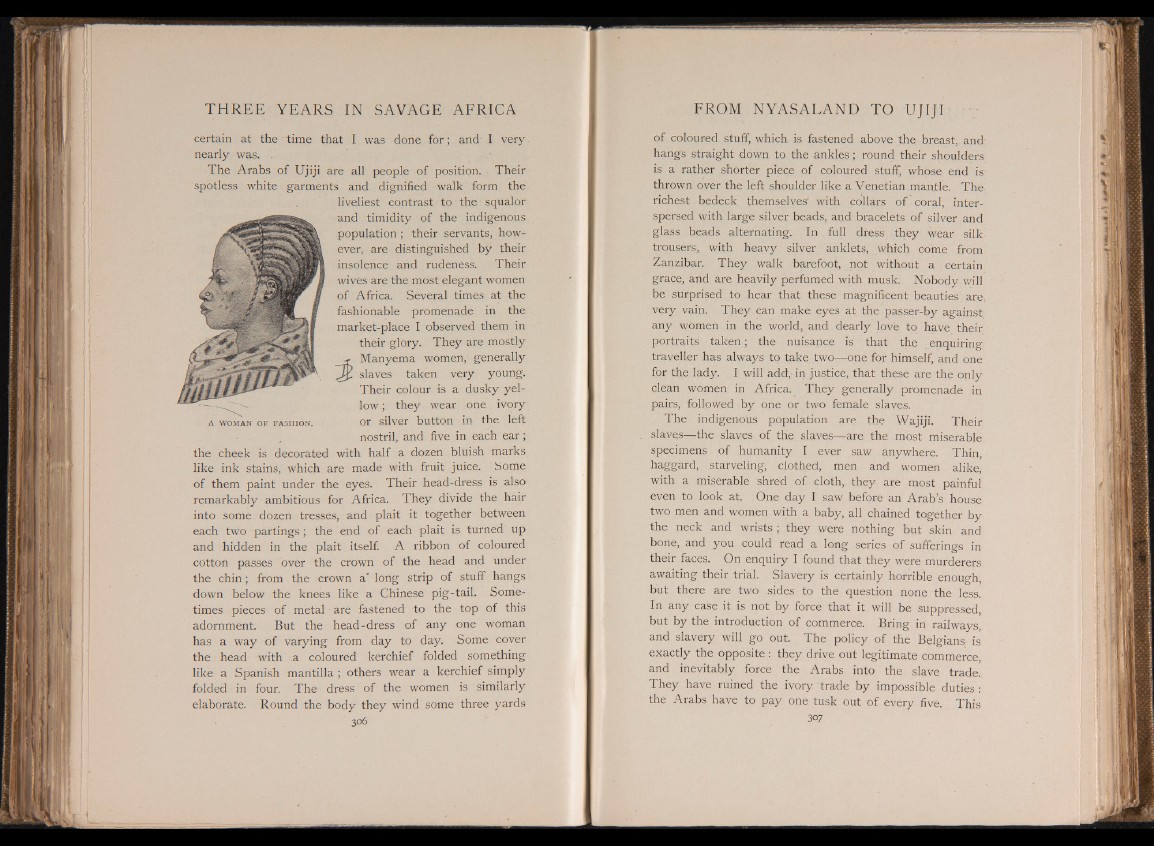
certain at the time that I was done for; and I very,
nearly was. -
The Arabs of Ujiji are all people of position. Their
spotless white garments and dignified walk form the
liveliest contrast to the squalor
and timidity of the indigenous
population ; their servants, however,
are distinguished by their
insolence and rudeness. Their
wives are the most elegant women
of Africa. Several times at the
fashionable promenade in the
market-place I observed them in
their glory. They are mostly
.f Manyema women, generally
slaves taken very young.
Their colour is a dusky yellow
; they wear one ivory
or silver button in the left
nostril, and five in each ear;
the cheek is decorated with half a dozen bluish marks
like ink stains, which are made with fruit juice. Some
of them paint under the eyes. Their head-dress is also
remarkably ambitious for Africa. They divide the hair
into some dozen tresses, and plait it together between
each two partings; the end of each plait is turned up
and hidden in the plait itself. A ribbon of coloured
cotton passes over the crown of the head and under
the chin ; from the crown a* long strip of stuff hangs
down below the knees like a Chinese pig-tail. Sometimes
pieces of metal are fastened to the top of this
adornment. But the head-dress of any one woman
has a way of varying from day to day. Some cover
the head with a coloured kerchief folded something
like a Spanish mantilla ; others wear a kerchief simply
folded in four. The dress of the women is similarly
elaborate. Round the body they wind some three yards
306
of coloured stuff, which is fastened above the breast, and
hangs straight down to the ankles .; round their shoulders
is a rather shorter piece of coloured stuff, whose end is
thrown over the left shoulder like a Venetian mantle. The
richest bedeck themselves' with collars of coral, interspersed
with large silver beads, and bracelets of silver and
glass beads alternating. In full dress they wear silk
trousers, with heavy silver anklets, which come from
Zanzibar. They walk barefoot, not without a certain
grace, and are heavily perfumed with. musk. Nobody will
be surprised to hear that these magnificent beauties are,
very vain. They can make eyes at the passer-by against
any women in the world, and dearly love to have their
portraits taken; the nuisance is that the enquiring
traveller has always to take two—one for himself, and one
for the lady. I will add,> in justice, that these are the only
clean women in Africa. They generally promenade in
pairs, followed by one or two female slaves.
The indigenous population are the Wajiji. Their
slaves—the slaves of the slaves—are the most miserable
specimens of humanity I ever saw anywhere. Thin,
haggard, starveling, clothed, men and women alike,
with a miserable shred of cloth, they are most painful
even to look at. One day I saw before an Arab’s house
two men and women with a baby, all chained together by
the neck and wrists ; they were nothing but skin and
bone, and you could read a long series of sufferings in
their faces. On enquiry I found that they were murderers
awaiting their trial. Slavery is certainly horrible enough,
but there are two sides to the question none the less.
In any case it is not by force that it will be suppressed,
but by the introduction of commerce. Bring in railways,
and slavery will go out. The policy of the Belgians is
exactly the opposite : they driye out legitimate commerce,
and inevitably force the Arabs into the slave trade.
They have ruined the ivory trade by impossible duties :
the Arabs have to pay one tusk out of every five. This
307